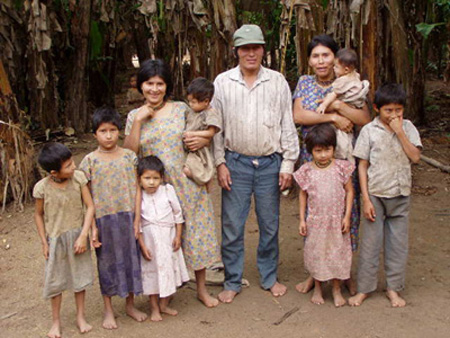TRANSFORM YOUR HEALTH WITH THE EXPERTISE AND EXPERIENCE OF A DOUBLE BOARD-CERTIFIED PHYSICIAN
TRANSFORM YOUR HEALTH WITH THE EXPERTISE AND EXPERIENCE OF A DOUBLE BOARD-CERTIFIED PHYSICIAN

Deep in the heart of the Bolivian Amazon, the Tsimane tribe has captivated scientists with their extraordinary health and longevity. This indigenous community, living a subsistence lifestyle of hunting, foraging, and farming, demonstrates remarkably low rates of Alzheimer’s disease and other age-related ailments. In fact, a study spanning over two decades has revealed zero cases of Alzheimer’s among the tribe’s 16,000 members. Their lives, free from the chronic diseases that plague much of the modern world, raise important questions about how lifestyle factors can affect brain health and longevity.
But this isn’t just a phenomenon confined to the Amazon. Throughout history, traditional societies across the globe, including those in Africa, have similarly thrived with minimal incidences of Alzheimer’s, dementia, and other degenerative diseases. By examining the lifestyle habits of the Tsimane tribe and the historical practices of African communities, we can begin to understand what modern industrialized societies have moved away from—and what we can potentially reclaim for better health.

The Tsimane people live a life deeply rooted in physical activity. Unlike many in industrialized nations, where sedentary behavior accounts for more than half of our waking hours, the Tsimane spend less than 10 percent of their daylight hours sitting still. Their daily lives are filled with movement: hunting wild animals, foraging for fruits and nuts, farming, and weaving roofs for their homes. Their average hunting expedition can last over eight hours, covering about 11 miles—a level of physical activity that’s far beyond what most people in modern societies experience.
Additionally, their diet is a far cry from the processed, fat-heavy foods common in the West. Only 14 percent of their calories come from fat, compared to the 34 percent in the U.S., and their diet is packed with fiber-rich carbohydrates. Their primary sources of protein are the animals they hunt—birds, monkeys, and fish—prepared without frying or excessive use of oils. This diet, low in processed foods and high in natural nutrients, likely contributes to the extraordinary heart and brain health observed in the Tsimane, who show 70 percent less brain atrophy compared to people of the same age in industrialized nations.
Though the focus of much of the scientific research on longevity has been on the Tsimane and other South American tribes, traditional African societies provide a similarly compelling narrative. For millennia, many African communities lived (and in some cases still live) in ways that parallel the Tsimane’s lifestyle—active, connected to nature, and reliant on whole foods.
In parts of rural Africa, Alzheimer’s and other forms of dementia were virtually non-existent up until recent decades. For example, a study in Nigeria found that the rate of dementia was significantly lower compared to African Americans living in the United States, even though both groups shared a genetic background. The key difference? Lifestyle.
Similar to the Tsimane, traditional African societies were characterized by diets rich in unprocessed foods, vegetables, and lean proteins, along with active daily routines of farming, hunting, and community engagement. Like many indigenous communities around the world, these societies lacked the high intake of sugar, unhealthy fats, and processed foods that have become ubiquitous in the modern world. Moreover, the social fabric of these societies played a role in maintaining mental and emotional health. Living in tightly-knit communities, with strong intergenerational bonds and shared responsibilities, contributed to lower levels of stress and mental decline as people aged.

Over time, as societies have industrialized and globalized, many of the health-promoting practices found in indigenous cultures have been left behind. Today, the prevalence of Alzheimer’s and other chronic diseases is rising at alarming rates in countries like the U.S. and the U.K., where the Western diet and sedentary lifestyle dominate.
Processed foods, high in sugars and unhealthy fats, are now staples in many diets. Work and leisure activities often require little physical exertion, leading to widespread inactivity. Additionally, our disconnection from nature and the breakdown of tight-knit communities have contributed to increased levels of stress, anxiety, and depression—factors that are all linked to cognitive decline.
The Tsimane tribe and traditional African societies offer more than just a glimpse into the past; they present a blueprint for the future of health. By prioritizing movement, whole foods, and community, we can reclaim some of the lifestyle habits that have allowed these groups to thrive well into old age without the chronic illnesses that have become all too common in modern life.
The science is clear: Lifestyle matters. Physical activity, a diet rich in natural, unprocessed foods, and meaningful social connections can go a long way in preventing diseases like Alzheimer’s. By looking to the past and learning from communities like the Tsimane, we can find answers to some of the biggest health challenges we face today.

Key Takeaways:
As we look to the future, it’s clear that a return to some of these ancestral habits could be key to improving health outcomes and extending the quality of life for millions of people across the globe.
DISCLAIMER: This is not intended to be medical advice. Always consult with your physician first.
*The statements (appearing on this website) have not been evaluated by the Food and Drug Administration. These products are not intended to diagnose, treat, cure, or prevent any disease.
Copyright © 2024 · All Rights Reserved · Dr Josh